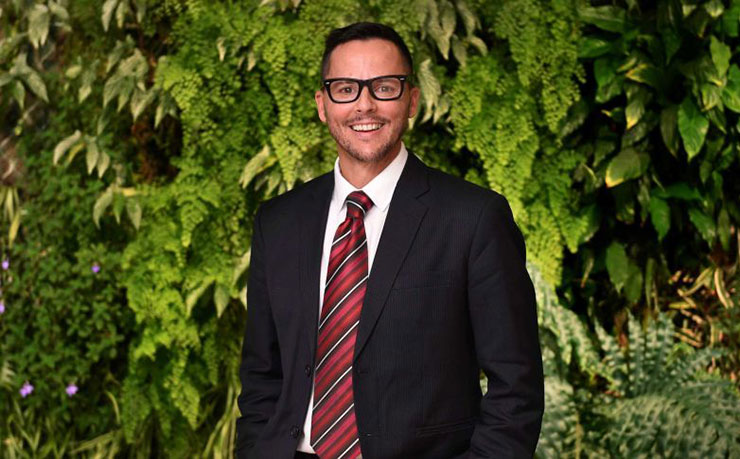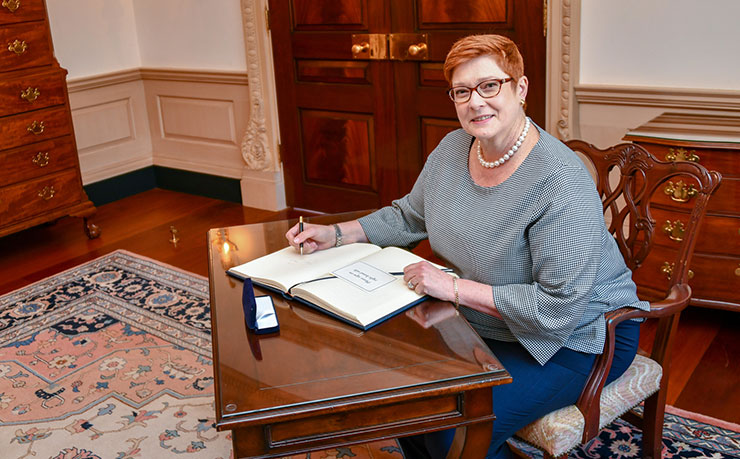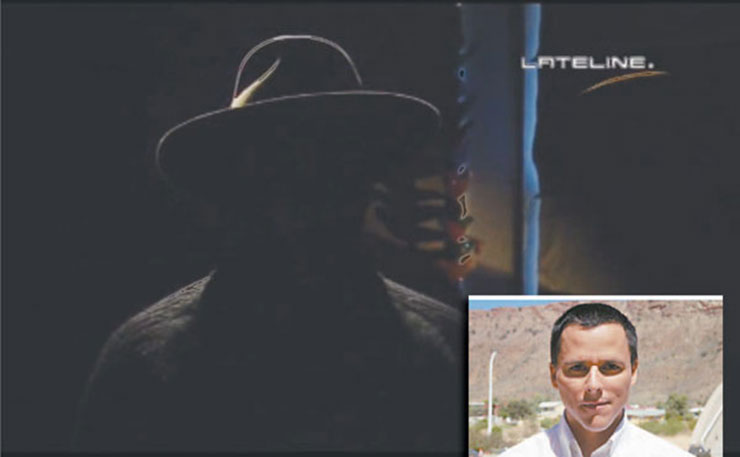An infamous federal government bureaucrat at the centre of one of the biggest scandals in the ABC’s history – a fraudulent story which sparked the multi-billion dollar Northern Territory intervention – has been promoted to serve as Australia’s High Commissioner to Ghana.
Gregory Andrews was working as a senior adviser to Indigenous affairs minister Mal Brough in 2006 when he appeared as the star witness in an ABC Lateline story which falsely described him as an ‘anonymous youth worker’.
Andrews – whose face was filmed in shadow and his voice digitized to hide his identity – appeared to weep openly on camera as he described how, in the mid-2000s, he reported incidents of sexual violence against women and children in Mutitjulu to police, but withdrew his statements after being threatened by powerful men in the community. It subsequently emerged the entire story was a fiction – Andrews had never made a single report of violence against women or children to police.
Andrews was also forced to apologise to the Federal Senate for providing misleading testimony, and later became the first public servant in history to avoid appearing before a Senate Inquiry on the grounds of stress.
The day after the ABC story was broadcast, the Northern Territory government announced a high-level inquiry into the claims. Almost a year later, the resulting reporting – Little Children Are Sacred – was used by the Howard Government as the basis for launching the Northern Territory intervention.

Reporting by Fairfax revealed that shortly before Prime Minister John Howard announced the NT intervention, it received a report from Liberal Party polling firm Crosby Textor advising it that its best chance of winning the 2007 election was to intervene in the affairs of the state and territory governments, to try and make them look incompetent (all state and territory governments at the time were controlled by Labor).
The strategy failed – the Howard government lost the election, with former Foreign Affairs minister Alexander Downer lamenting afterwards that despite the loss, the policy proved popular with Australian voters.
Andrews worked in the community of Mutitjulu for a short period in 2005 as a project manager for the Northern Territory government. He subsequently joined the Department of Families and Community Services, Housing and Indigenous Affairs, and was providing advice directly to Minister Brough when the ABC falsely described him as an ‘anonymous youth worker’.
Talking points which had been prepared by Andrews for the minister prior to his appearance on Lateline were subsequently leaked – they revealed that once Andrews was provided anonymity by Lateline, he grossly embellished his story.
Andrews claimed children were being traded between Aboriginal communities in Central Australia as “sex slaves”. A lengthy investigation by Northern Territory police found “no evidence whatsoever” to support the claims. An Australian Crime Commission investigation also found the allegations to be false.
It also emerged that a doctor who appeared in the ABC Lateline report, Geoff Stewart, had been prescribing Viagra to the alleged elderly paedophile at the centre of the Lateline story, including for eight months after he wrote in the man’s health records, “…is using Viagra to have sex with young females”.
The ABC was leaked a report which revealed Mutitjulu residents were concerned about a doctor in the community prescribing Viagra to the elderly man, however Lateline suppressed that information and instead broadcast testimony from Dr Stewart alleging that Aboriginal men in the community had created an environment where children were being sexually abused.
The ABC launched an investigation into the story, but ultimately found in Lateline’s favour. The complaints review process which cleared the program was subsequently abolished by the ABC.
Mr Andrews, who was pursued by the Labor Party while in Opposition and reportedly became the first government bureaucrat in history to avoid appearing before a Senate Inquiry on the grounds of stress, left the Commonwealth public service when Labor gained office in 2007. However, he returned in 2012*, and in mid-2014 was appointed by the Abbott Government to the role of Threatened Species Commissioner by Environment Minister Greg Hunt, despite having no expertise in the area.
Mr Andrews returned to the Department of Foreign Affairs when his term as Commissioner expired, and was moved to the Australian embassy in Beijing as First Secretary.
On Friday afternoon, Minister for Foreign Affairs, Marise Payne announced Andrews had been promoted to the role of High Commissioner to Ghana, noting it was an important location given Australian companies’ interests in the “extractive sector”.

“Australia’s relations with Ghana are underpinned by our shared democratic and Commonwealth traditions, and by the strong linkages between our people. The thousands of Ghanaians who have made Australia their home and similarly, the growing community of Australians living and working in Ghana, help to enrich both nations.
“Australian companies working in the extractives sector also add significant value to Ghana’s economy. Australia has been pleased to support Ghana through development programs aimed at building capacity in mining, health, education and food security. Australia Awards scholarships and courses are a key part of this support and help to reinforce bilateral ties.”
Minister Payne noted: “In Australia Mr Andrews has served as the Threatened Species Commissioner, Department of Environment and Energy; Senior Adviser, Office of the Minister for the Environment; Assistant Secretary, Department of Climate Change and Energy; CEO, Indigenous Community Volunteers; and Assistant Secretary, Department of Families, Housing, Community Services and Indigenous Affairs.”
The ABC journalist who concocted the story, Suzanne Smith, was a consulting editor for Crikey.com.au until late last year. The producer of the article, Brett Evans, was promoted to Executive Producer of ABC’s Media Watch program, and now works for Inside Edition as a contributing editor. The doctor in the story, Geoff Stewart, wen on to serve as the Senior Medical Officer for the Aboriginal Medical Services Alliance of the Northern Territory.
The Aboriginal people in the story, targetted as whistleblowers by the Commonwealth Government, had vastly different experiences.
Tjanara Goreng Goreng, an Aboriginal woman working for the government at the time had her Canberra home raided by the Australian Federal Police. She was subsequently prosecuted for unrelated leaks of Commonwealth information, and bankrupted by the court proceedings.
Ms Goreng Goreng bounced back from the government assault, winning election onto the ACT’s Indigenous advisory body in 2015. She recently announced she is running in the August elections in the ACT for the Greens.
Two other Aboriginal people in Mutitjulu also had their homes raided by Federal Police.
You can read a detailed feature on the ABC Lateline scandal here. This writer was one of the journalists who worked on the original investigation published by the National Indigenous Times.
* CORRECTION & UPDATE: The first version of this article incorrectly stated that Mr Andrews returned to the public service in 2013, after the election of the Abbott Government. He in fact returned in 2012. The error was that of the author. UPDATE: Crikey has advised Suzanne Smith is no longer working for them. Their website has been updated accordingly.
Donate To New Matilda
New Matilda is a small, independent media outlet. We survive through reader contributions, and never losing a lawsuit. If you got something from this article, giving something back helps us to continue speaking truth to power. Every little bit counts.




